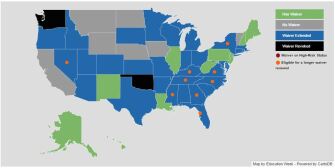UPDATED
Six additional states have now seen their No Child Left Behind waivers extended through the end of this school year: Arizona, Massachusetts, Missouri, Oregon, Rhode Island, and Utah.
The extensions mean that Arizona and Oregon are off of “high-risk” status. Both states, along with Kansas and Washington, were warned last year that they could lose their waivers. In all four cases, the problems stemmed from the states’ plans fo teacher evaluation. Since then, Washington has lost its waiver—and the U.S. Department of Education has made some dramatic changes to its policy on teacher evaluation, allowing states extra time to incorporate student outcomes into teacher performance reviews.
Notably, Utah nearly ditched its NCLB waiver altogether, citing federal overreach. The Beehive State was among the last to file for an extension.
Many of the extensions come with caveats. For instance:
•Massachusetts had sought to revise its waiver to allow districts to pick their own assessment this academic year. The Bay State planned on giving districts a choice between the new Partnership for Assessment of Readiness for College and Careers, or PARCC, tests, or the traditional Massachusetts Comprehensive Assessment System, or MCAS, tests. The department argued that the NCLB law requires everyone in the state to take the same test, and nixed the proposed amendment. (Interestingly, the requirement that all districts take the same test did not stop the Education Department from allowing a Kansas district to opt for the ACT for its eleventh graders, instead of the state assessment.)
The back-and-forth over the amendment may partly explain Massachusetts was among the last states to get a waiver extension. Ultimately, however, the department gave the Bay State until the 2015-16 school year to pick one test for everyone. So it sounds like the state may have some flexibility to offer districts a choice this school year. Much more in this smart post from Catherine Gewertz of Curriculum Matters.
•Missouri’s extension comes with some strings, too. The Show Me State made a change to its assessment plan since submitting its initial waiver. It will use the Smarter Balanced tests in grades 5 and 8, as well as a “scaled down” version in grades 3, 4, 6, and 7, according to my colleague, Andrew Ujifusa. Missouri will have to continue to work with the department on its testing plan.
•Arizona famously clashed with the Education Department over how graduation rates figure into its accountability system. The feds wanted them to count for 20 percent; the Grand Canyon state held firm at 15 percent. It seems Arizona won out, according to its letter. The state will still need to work with the department on its teacher evaluation system, though.
•Similarly, Oregon got to shed its “high risk” label, but the state still has a “condition” on its teacher evaluation system. The Beaver State needs to show that it is giving teachers clear guidance when it comes to setting “student learning objectives” which are used as part of educators’ performance review systems.
None of these states were given a gold star from the department, indicating that they are in line for an extra-special longer waiver renewal. The department is reserving those renewals as a reward for states whose teacher and principal evaluation systems have remained on track, even in the face of numerous policy twists and turns from the department.
Update your score card: Twenty-nine states have now been approved for waiver extensions, according to the department. Thirty-five states saw their waivers expire over the summer, and they have all submitted requests to keep them. The department is still reviewing extension requests from Louisiana, New Jersey and New Mexico.
Check out our updated map here:

